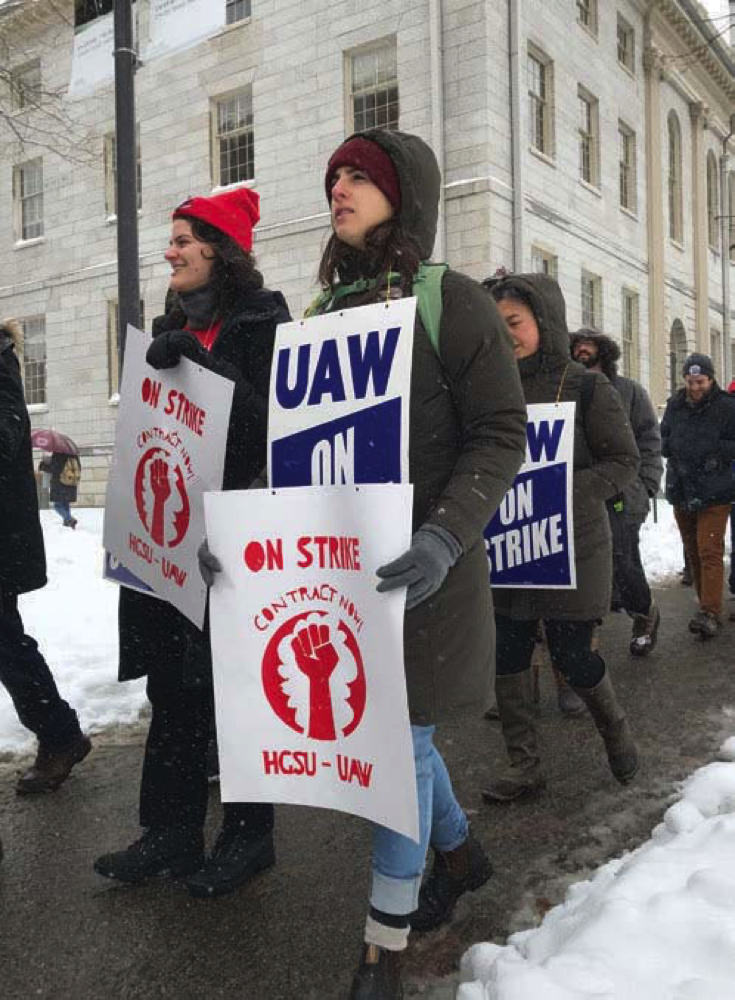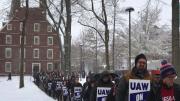At press time, two days before the beginning of winter reading period, the Harvard Graduate Student Union-United Auto Workers (HGSU-UAW) began a strike, with day-long picket lines planned during the first week of December in Harvard Yard and at the Longwood medical campus. “We’re disappointed that we haven’t been able to make headway in discrimination and harassment protections,” said Aaron Bekemeyer, a sixth-year Ph.D. candidate in the history department, one of several hundred union members picketing in the Yard. Harvard and the 5,000-member union have reached some agreements since negotiations began more than a year ago, but they’ve remained at an impasse on some of HGSU-UAW’s key demands. In October, more than 90 percent of voting union members elected to authorize a strike, and little progress has been made since then on either compensation or the union’s demand for an independent investigation process for harassment and discrimination.
“We definitely see striking as a last resort, but we’ve run out of alternatives to address some of our core demands,” said Ege Yumusak ’16, a Ph.D. candidate in philosophy and member of HGSU-UAW’s bargaining committee, in an interview in November.
A strike “will neither clarify our respective positions nor will it resolve areas of disagreement,” University provost Alan Garber, who is Harvard’s lead negotiator for this contract, said in an email to the campus community. Harvard has notified students that it will make “every effort” to ensure that semester grades and exams are not disrupted, and has sent faculty members guidance on completing grading and instructional work during the strike.

Walking the line: Graduate Student Union picketers in Harvard Yard on December 3, the morning their strike began.
Photograph by Jonathan Shaw/Harvard Magazine
In an email to its members, the Harvard Union of Clerical and Technical Workers, which includes workers in the University’s libraries, museums, labs, and elsewhere, said: “One very meaningful way you can show support for striking HGSU-UAW workers is by turning down work you are asked to do that would normally be done by striking graduate students.” Local and state lawmakers, including the Massachusetts congressional delegation, have also expressed support for the student workers.
Harvard has offered HGSU-UAW pay raises of 8 percent over three years for salaried students, and 7 percent over three years for teaching fellows. It has also proposed raising minimum hourly pay for all student workers to $15, and to $17 for instructional workers. Currently, hourly workers may make substantially less: “There are people on this campus who are making minimum wage [$12 per hour],” Yumusak said.
Student workers’ main compensation concern, said bargaining committee member Justin Bloesch, a Ph.D. candidate in economics, is that it keep up with the cost of living. “Two years ago, in response to underperformance of the endowment, stipends were raised 1.5 percent, but Harvard housing was increased by 3 percent,” he pointed out.
Students are also concerned about how “top-up” payments will factor into raises. When Ph.D. students begin teaching, typically in their third year, a portion of their pay comes from that work, but not enough to equal the living stipends they received in their first and second years. The top-up, which amounts to $3,825 per semester this year, makes up the difference. But Yumusak noted that Harvard considers this money financial aid, not pay, so it may not be included in any pay raises in the final contract. The University is effectively “refusing to negotiate over total compensation,” she said.
Benefits are at issue, too. Graduate students don’t automatically receive dental insurance, nor are spouses or children covered. “It’s $7,000 to insure a spouse, $4,000 to insure a child” for healthcare, Bloesch said. The University has offered the union some help to cover some of these expenses, including a fund of $300,000 per year to defray the cost of spousal and child health insurance, and a fund of $100,000 for students’ dental costs. HGSU-UAW has argued that the costs of health care are too high for these funds to make much difference: $100,000 would be enough to defray each Ph.D. student’s annual dental cost by about $25.
Arguably the most contentious sticking point in the negotiations is the handling of sexual-harassment and discrimination cases. HGSU-UAW has proposed an independent, third-party arbitration process, similar to that used for other violations of the contract, whereas Harvard wants to investigate these cases through its Title IX Office and Office of Dispute Resolution, where University sexual-harassment cases are usually handled.
Discrimination and harassment became a core focus for HGSU-UAW in 2018, Yumusak said, after the case of former professor Jorge Domínguez came to light (see harvardmag.com/dominguez-18). “Eighteen women were harassed over three decades with no institutional accountability whatsoever,” she explained. “Students have lost trust in the institution’s ability to” address these cases.
“The union’s proposal would carve out student workers as having a separate process from all other students, which we do not believe meets the requirements of current or proposed federal Title IX regulations,” University spokesman Jonathan Swain noted in a November statement. “The University has proposed significant opportunities for HGSU-UAW members to have an ongoing role in making recommendations on how to strengthen policies and processes aimed at preventing and addressing harassment and discrimination.” At the Faculty of Arts and Sciences’ November meeting, Alan Garber acknowledged the importance of these issues—but he disagreed outright with the union proposal.
The negotiations themselves are taking place in an uncertain landscape for the rights of student workers. In September, the National Labor Relations Board (NLRB) proposed a rule that would revoke the right of private university students to form labor unions. But whatever the fate of graduate students’ rights under the NLRB, Bloesch said, a key lesson of the unionization process has been that student workers can exercise power by withholding their labor: “Really, the power that we have is in the ability to strike.”
For more detailed coverage of the issues, see harvardmag.com/hgsu-uaw-strike-plan-19. Updates on the strike will be posted at www.harvardmagazine.com.









